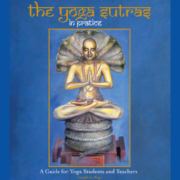The Future of Humanity: Survival of the Most Spiritual through Meditation
I relate to you the means to be employed for the destruction of dis-ease;
Without the practice of yoga, how could knowledge set the Atman free?
Inversely, how could the practice of yoga alone, devoid of knowledge, succeed in the task?
The seeker of Liberation must direct his energies to both simultaneously.
– Yogatattva Upanishad verses 14–15
Human evolutionary history is characterized by ever increasing cognitive abilities that provide an evolutionary advantage in terms of survival, success, and procreation. These advances have made us the dominant species on the planet today. Evolution as we know it has always focused on competing and succeeding for resources, procreation and social hierarchy. From the spiritual perspective, the ultimate intention of evolution is more than just fulfilling basic survival needs. This can be seen by the fact that the problems and risks presented by our focus on material evolution now outweigh the benefits because our drive to expand, compete, conquer and succeed seem to be taking us toward the extinction of the planet and the human race as a species. Evolution is now heading into a new phase which can be called survival of the most spiritual. The levels of stress and stress-related illness have become so high that success now needs to be seen in terms of quality of life, self-knowledge and the ability to live in cooperation and community.
Some neurological research supports this through the changes observed in the brain structure of meditators. Research has shown that meditators’ brains lose less gray matter with aging (UCLA Florian Kurth). Research also found that meditation increases the cortical thickness of the hippocampus related to regulation of emotion while decreasing the cell volume in the amygdala which is related to the fight or flight response. In the traditional model of survival of the fittest, this could be a disadvantage, but in an environment in which the true threat is chronic stress and not the saber-toothed tiger, it becomes an advantage.
It was also found that these changes in the brain are associated with improved mood and well-being, which in a stressful environment, promotes not only health but also success in any area of activity. Meditation also improves concentration and attention, essential skills for success and achievement in any area (Michael D. Mrazek). Additionally, a study found that meditators live longer and have a much lower risk of heart disease and cancer. These benefits are not limited to meditation but are also true of those who practice any type of spirituality. A study from Duke University showed that for those with any form of spiritual support, rates of serious illness can be up to 40% less. (Harold G. Koenig, M.D)
These studies point to the possibility that the future of evolution, traditionally understood as survival of the fittest, may, in the modern context, mean survival of the healthiest, which, can be translated as those best able to cope with stress. As we have seen, spirituality is one of the best supports for coping with stress.
Spirituality also instills a sense of oneness with creation and a sense of respect for and unity with the natural world. Therefore, if evolution takes us to greater levels of success as a species, spirituality may now be its truest expression and perhaps the only solution for the future of our planet and humanity.
Reflection: Is there any other alternative for the evolution of the human species if not through recognition of our inherent wholeness in oneness with all of creation?
Joseph Le Page
Integrative Yoga Therapy
Get to Know: Mudras for Healing and Transformation












